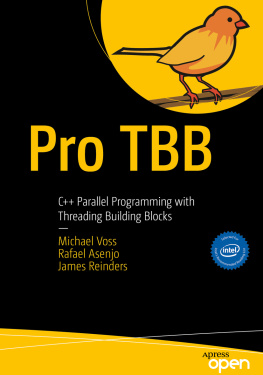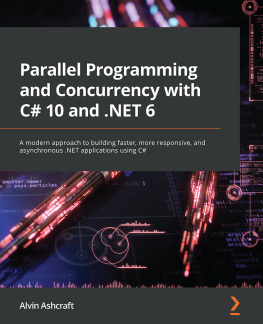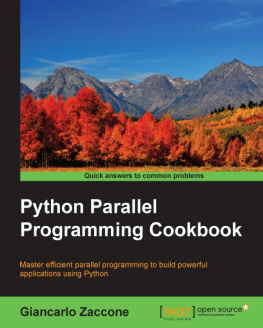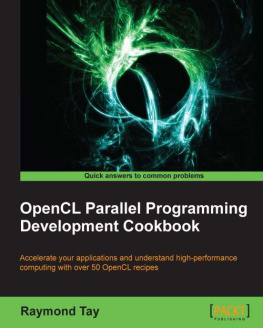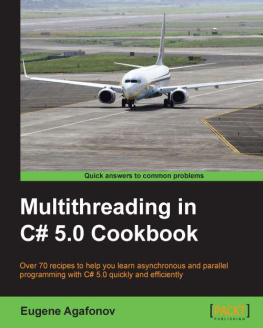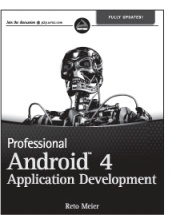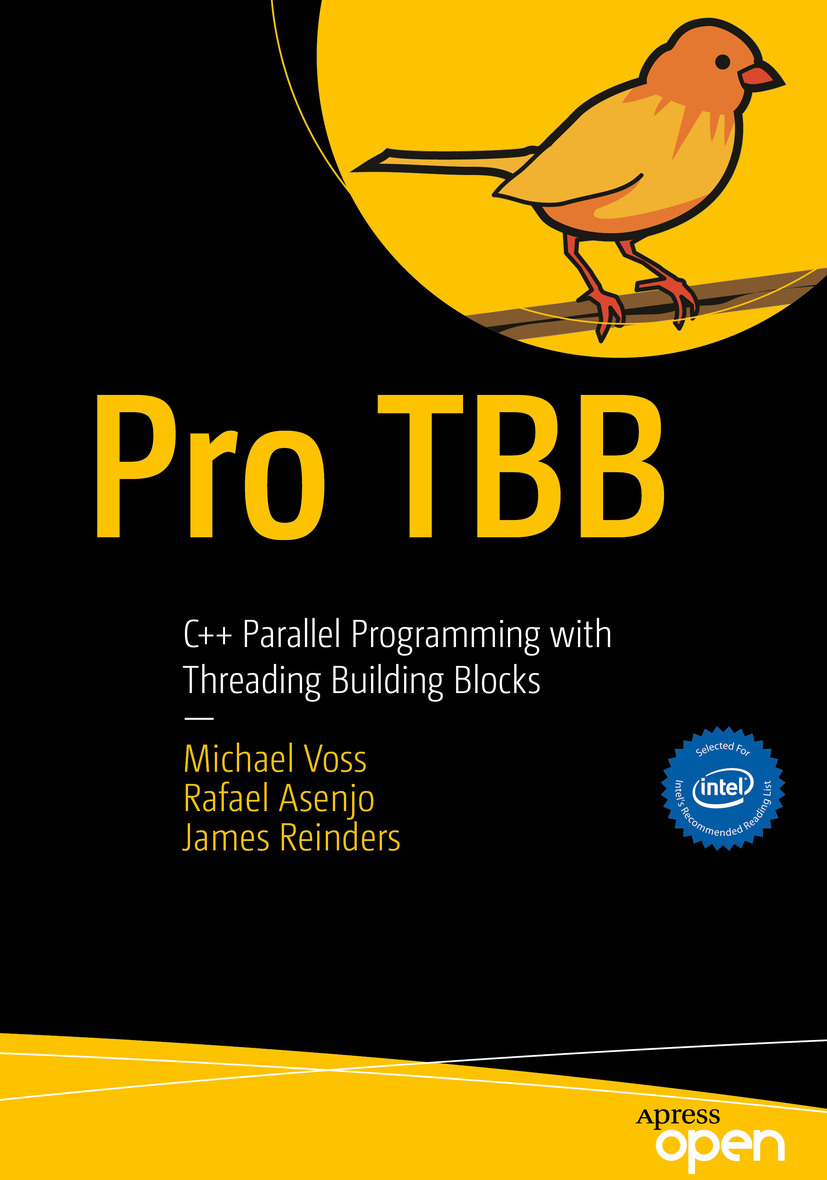Michael Voss
Austin, Texas, USA
Rafael Asenjo
Mlaga, Spain
James Reinders
Portland, Oregon, USA
Any source code or other supplementary material referenced by the author in this book is available to readers on GitHub via the books product page, located at www.apress.com/978-1-4842-4397-8 . For more detailed information, please visit http://www.apress.com/source-code .
ISBN 978-1-4842-4397-8 e-ISBN 978-1-4842-4398-5
https://doi.org/10.1007/978-1-4842-4398-5
This book is an open access publication.
Intel Corporation 2019

Open Access This book is licensed under the terms of the Creative Commons Attribution-NonCommercial-NoDerivatives 4.0 International License (http://creativecommons.org/licenses/by-nc-nd/4.0/), which permits any noncommercial use, sharing, distribution and reproduction in any medium or format, as long as you give appropriate credit to the original author(s) and the source, provide a link to the Creative Commons license and indicate if you modified the licensed material. You do not have permission under this license to share adapted material derived from this book or parts of it.
The images or other third party material in this book are included in the book's Creative Commons license, unless indicated otherwise in a credit line to the material. If material is not included in the book's Creative Commons license and your intended use is not permitted by statutory regulation or exceeds the permitted use, you will need to obtain permission directly from the copyright holder.
This work is subject to copyright. All commercial rights are reserved by the author(s), whether the whole or part of the material is concerned, specifically the rights of translation, reprinting, reuse of illustrations, recitation, broadcasting, reproduction on microfilms or in any other physical way, and transmission or information storage and retrieval, electronic adaptation, computer software, or by similar or dissimilar methodology now known or hereafter developed. Regarding these commercial rights a non-exclusive license has been granted to the publisher.
Trademarked names, logos, and images may appear in this book. Rather than use a trademark symbol with every occurrence of a trademarked name, logo, or image we use the names, logos, and images only in an editorial fashion and to the benefit of the trademark owner, with no intention of infringement of the trademark. The use in this publication of trade names, trademarks, service marks, and similar terms, even if they are not identified as such, is not to be taken as an expression of opinion as to whether or not they are subject to proprietary rights.
While the advice and information in this book are believed to be true and accurate at the date of publication, neither the authors nor the editors nor the publisher can accept any legal responsibility for any errors or omissions that may be made. The publisher makes no warranty, express or implied, with respect to the material contained herein.
Distributed to the book trade worldwide by Springer Science+Business Media New York, 233 Spring Street, 6th Floor, New York, NY 10013. Phone 1-800-SPRINGER, fax (201) 348-4505, e-mail orders-ny@springer-sbm.com, or visit www.springeronline.com. Apress Media, LLC is a California LLC and the sole member (owner) is Springer Science + Business Media Finance Inc (SSBM Finance Inc). SSBM Finance Inc is a Delaware corporation.
Preface
Think Parallel
We have aimed to make this book useful for those who are new to parallel programming as well as those who are expert in parallel programming. We have also made this book approachable for those who are comfortable only with C programming, as well as those who are fluent in C++.
In order to address this diverse audience without dumbing down the book, we have written this Preface to level the playing field.
What Is TBB
TBB is a solution for writing parallel programs in C++ which has become the most popular, and extensive, support for parallel programming in C++. It is widely used and very popular for a good reason. More than 10 years old, TBB has stood the test of time and has been influential in the inclusion of parallel programming support in the C++ standard. While C++11 made major additions for parallel programming, and C++17 and C++2x take that ever further, most of what TBB offers is much more than what belongs in a language standard. TBB was introduced in 2006, so it contains support for pre-C++11 compilers. We have simplified matters by taking a modern look at TBB and assuming C++11. Common advice today is if you dont have a C++11 compiler, get one. Compared with the 2007 book on TBB, we think C++11, with lambda support in particular, makes TBB both richer and easier to understand and use.
TBB is simply the best way to write a parallel program in C++, and we hope to help you be very productive in using TBB.
Organization of the Book and Preface
This book is organized into four major sections:
- I.
Preface: Background and fundamentals useful for understanding the remainder of the book. Includes motivations for the TBB parallel programming model, an introduction to parallel programming, an introduction to locality and caches, an introduction to vectorization (SIMD), and an introduction to the features of C++ (beyond those in the C language) which are supported or used by TBB.
- II.
Chapters : A book on TBB in its own right. Includes an introduction to TBB sufficient to do a great deal of effective parallel programming.
- III.
Chapters : Include special topics that give a deeper understanding of TBB and parallel programming and deal with nuances in both.
- IV.
Appendices A and B and Glossary: A collection of useful information about TBB that you may find interesting, including history (Appendix A) and a complete reference guide (Appendix B).
Think Parallel
For those new to parallel programming, we offer this Preface to provide a foundation that will make the remainder of the book more useful, approachable, and self-contained. We have attempted to assume only a basic understanding of C programming and introduce the key elements of C++ that TBB relies upon and supports. We introduce parallel programming from a practical standpoint that emphasizes what makes parallel programs most effective. For experienced parallel programmers, we hope this Preface will be a quick read that provides a useful refresher on the key vocabulary and thinking that allow us to make the most of parallel computer hardware.
After reading this Preface, you should be able to explain what it means to Think Parallel in terms of decomposition, scaling, correctness, abstraction, and patterns. You will appreciate that locality is a key concern for all parallel programming. You will understand the philosophy of supporting task programming instead of thread programming

